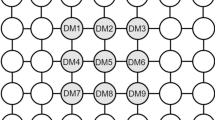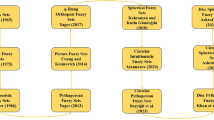Abstract
In a three-valued situation table, researchers have investigated the relationship between two agents by using auxiliary and distance functions, and proposed several models of conflict analysis for trisecting the set of all pairs of agents. But we have not observed a unification of these conflict analysis models. In this paper, we introduce the concepts of conditional alliance and conflict evaluations of two agents towards a subset of issues. In the framework of three-way decision, we propose a general model of three-way conflict analysis, and study three levels of conflict between two agents. We illustrate that five models of conflict analysis for trisecting the set of all pairs of agents are special cases of the general model, and provide a deep insight into the models of conflict analysis based on three-way decision.
Similar content being viewed by others
References
Azam N, Zhang Y, Yao JT (2017) Evaluation functions and decision conditions of three-way decisions with game-theoretic rough sets. Eur J Oper Res 261:704–714
Deja R (2002) Conflict analysis. Int J Intell Syst 17:235–253
Deja R (2003) Rough set approach to conflict analysis. In: Inuiguchi M, Hirano S, Tsumoto S (eds) Rough set theory and granular computing. Studies in fuzziness and soft computing. Springer, Berlin, 211 p
Deng XF, Yao YY, Yao JT (2014) On interpreting three-way decisions through two-way decisions. In: International symposium on methodologies for intelligent systems, ISMIS2014, Roskilde, Denmark, June 25-27, LNCS(LNAI), vol 8502, pp 73–82
Fan Y, Qi JJ, Wei L (2018) A conflict analysis model based on three-way decisions. In: International joint conference on rough sets, IJCRS 2018, Quy Nhon, Vietnam, August 20-24, LNCS(LNAI), vol 11103, pp 522–532
Hao C, Li JH, Fan M, Liu WQ, Eric CC (2017) Tsang, Optimal scale selection in dynamic multi-scale decision tables based on sequential three-way decisions. Inf Sci 415–416:213–232
He XL, Wei L, She YH (2018) L-fuzzy concept analysis for three-way decisions: basic definitions and fuzzy inference mechanisms. Int J Mach Learn Cybern 9:1857–1867
Hu MJ, Yao YY (2019) Structured approximations as a basis for three-way decisions in rough set theory. Knowl-Based Syst 165:92–109
Huang CC, Li JH, Mei CL, Wu WZ (2017) Three-way concept learning based on cognitive operators: an information fusion viewpoint. Int J Approx Reason 83:218–242
Jiao L, Yang HL, Li SG (2019) Three-way decision based on decision-theoretic rough sets with single-valued neutrosophic information. Int J Mach Learn Cybern. https://doi.org/10.1007/s13042-019-01023-3
Lang GM, Luo JF, Yao YY (2020) Three-way conflict analysis: a unification of models based on rough sets and formal concept analysis. Knowl-based Systems. https://doi.org/10.1016/j.knosys.2020.105556
Lang GM, Miao DQ, Cai MJ (2017) Three-way decision approaches to conflict analysis using decision-theoretic rough set theory. Inf Sci 406–407:185–207
Lang GM, Miao DQ, Fujita H (2019) Three-way group conflict analysis based on Pythagorean fuzzy set theory. IEEE Trans Fuzzy Syst. https://doi.org/10.1109/TFUZZ.2019.2908123
Li JH, Huang CC, Qi JJ, Qian YH, Liu WQ (2017) Three-way cognitive concept learning via multi-granularity. Inf Sci 378:244–263
Liang DC, Wang MW, Xu ZS, Liu D (2020) Risk appetite dual hesitant fuzzy three-way decisions with TODIM. Inf Sci 507:585–605
Liu D, Liang DC (2017) Three-way decisions in ordered decision system. Knowl-Based Syst 137:182–195
Liu Y, Lin Y (2015) Intuitionistic fuzzy rough set model based on conflict distance and applications. Appl Soft Comput 31:266–273
Luo JF, Fujita H, Yao YY, Qin KY (2019) On modeling similarity and three-way decision under incomplete information in rough set theory. Knowl-Based Syst. https://doi.org/10.1016/j.knosys.2019.105251
Luo C, Li TR, Huang YY, Fujita H (2019) Updating three-way decisions in incomplete multi-scale information systems. Inf Sci 476:274–289
Pawlak Z (1984) On conflicts. Int J Man Mach Stud 21:127–134
Pawlak Z (1998) An inquiry into anatomy of conflicts. Inf Sci 109:65–78
Pawlak Z (2005) Some remarks on conflict analysis. Eur J Oper Res 166:649–654
Przybyla-Kasperek M, Wakulicz-Deja A (2014) Global decision-making system with dynamically generated clusters. Inf Sci 70:172–191
Przybyla-Kasperek M, Wakulicz-Deja A (2016) The strength of coalition in a dispersed decision support system with negotiations. Eur J Oper Res 252:947–968
Przybyla-Kasperek M, Wakulicz-Deja A (2017) Dispersed decision-making system with fusion methods from the rank level and the measurement level-A comparative study. Inf Syst 69:124–154
Qian T, Wei L, Qi JJ (2017) Constructing three-way concept lattices based on apposition and subposition of formal contexts. Knowl-Based Syst 116:39–48
Ramanna S, Peters J, Skowron A (2007) Approaches to conflict dynamics based on rough sets. Fundam Inform 75:453–468
Singh PK (2017) Three-way fuzzy concept lattice representation using neutrosophic set. Int J Mach Learn Cybern 8:69–79
Singh PK (2018) Three-way n-valued neutrosophic concept lattice at different granulation. Int J Mach Learn Cybern 9:1839–1855
Shivhare R, Cherukuri AK (2017) Three-way conceptual approach for cognitive memory functionalities. Int J Mach Learn Cybern 8:21–34
Skowron A, Deja R (2002) On some conflict models and conflict resolutions, Romanian. J Inf Sci Technol 5:69–82
Sun BZ, Chen XT, Zhang LY, Ma WM (2020) Three-way decision making approach to conflict analysis and resolution using probabilistic rough set over two universes. Inf Sci 507:809–822
Sun BZ, Ma WM (2015) Rough approximation of a preference relation by multi-decision dominance for a multi-agent conflict analysis problem. Inf Sci 315:39–53
Sun BZ, Ma WM, Zhao HY (2016) Rough set-based conflict analysis model and method over two universes. Inf Sci 372:111–125
Wang XZ, Li JH (2018) Three-way decisions, concept lattice and granular computing: Editorial. Int J Mach Learn Cybern 9:1765–1766
Wang PX, Shi H, Yang XB, Mi JS (2019) Three-way k-means: integrating k-means and three-way decision. Int J Mach Learn Cybern 10:2767–2777
Yan YT, Wu ZB, Du XQ, Chen J, Zhao S, Zhang YP (2019) A three-way decision ensemble method for imbalanced data oversampling. Int J Approx Reason 107:1–16
Yang XP, Li TJ, Tan AH (2019) Three-way decisions in fuzzy incomplete information systems. Int J Mach Learn Cybern. https://doi.org/10.1007/s13042-019-01025-1
Yao YY (2020) Three-way granular computing, rough sets, and formal concept analysis. Int J Approx Reason 116:106–125
Yao YY (2012) An outline of a theory of three-way decisions. In: International conference on rough sets and current trends in computing, RSCTC 2012, Chengdu, China, August 17-20, LNCS(LNAI), vol 7413, pp 1–17
Yao YY (2016) Three-way decisions and cognitive computing. Cogn Comput 8:543–554
Yao YY (2017) Interval sets and three-way concept analysis in incomplete contexts. Int J Mach Learn Cybern 8:3–20
Yao YY (2018) Three-way decision and granular computing. Int J Approx Reason 103:107–123
Yao YY (2019) Three-way conflict analysis: reformulations and extensions of the Pawlak model. Knowl-Based Syst 180:26–37
Yao YY (2019) Tri-level thinking: models of three-way decision. Int J Machine Learn Cybern. https://doi.org/10.1007/s13042-019-01040-2
Yu H, Chang ZH, Wang GY, Chen XF (2019) An efficient three-way clustering algorithm based on gravitational search. Int J Mach Learn Cybern. https://doi.org/10.1007/s13042-019-00988-5
Yu HY, Li QG, Cai MJ (2018) Characteristics of three-way concept lattices and three-way rough concept lattices. Knowl-Based Syst 146:181–189
Yu T, Liang X, Shen GQ, Shi Q, Wang G (2019) An optimization model for managing stakeholder conflicts in urban redevelopment projects in China. J Clean Prod 212:537–547
Zhai JH, Zhang Y, Zhu HY (2017) Three-way decisions model based on tolerance rough fuzzy set. Int J Mach Learn Cybern 8:35–43
Zhang QH, Lv GX, Chen YH, Wang GY (2018) A dynamic three-way decision model based on the updating of attribute values. Knowl-Based Syst 142:71–84
Zhang YJ, Miao DQ, Zhang ZF, Xu JF, Luo S (2018) A three-way selective ensemble model for multi-label classification. Int J Approx Reason 103:394–413
Zhang XY, Miao DQ (2017) Three-way attribute reducts. Int J Approx Reason 88:401–434
Zhang XY, Yang JL, Tang LY (2020) Three-way class-specific attribute reducts from the information viewpoint. Inf Sci 507:840–872
Zhi HL, Qi JJ, Qian T, Ren RS (2020) Conflict analysis under one-vote veto based on approximate three-way concept lattice. Inf Sci 516:316–330
Zhi HL, Qi JJ, Qian T, Wei L (2019) Three-way dual concept analysis. Int J Approx Reason 114:151–165
Acknowledgements
This paper was written while the author was Visiting Scholar at the University of Regina, the author is grateful to Dr. Yiyu Yao for his valuable comments and suggestions. The author is grateful to the anonymous reviewers for their professional comments and suggestions. This work was supported in part by the China Scholarship Council (No. 201808430120), the National Natural Science Foundation of China (No. 61603063), Hunan Provincial Natural Science Foundation of China (No. 2018JJ3518), Hunan Provincial Education Department Foundation (No. 19B027), and the Scientific Research Fund of Hunan Provincial Key Laboratory of Mathematical Modeling and Analysis in Engineering (No. 2018MMAEZD10).
Author information
Authors and Affiliations
Corresponding author
Additional information
Publisher's Note
Springer Nature remains neutral with regard to jurisdictional claims in published maps and institutional affiliations.
Rights and permissions
About this article
Cite this article
Lang, G. A general conflict analysis model based on three-way decision. Int. J. Mach. Learn. & Cyber. 11, 1083–1094 (2020). https://doi.org/10.1007/s13042-020-01100-y
Received:
Accepted:
Published:
Issue Date:
DOI: https://doi.org/10.1007/s13042-020-01100-y




